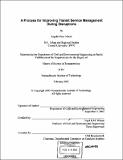A process for improving transit service management during disruptions
Author(s)
Moore, Angela Mary, 1975-
DownloadFull printable version (10.81Mb)
Other Contributors
Massachusetts Institute of Technology. Dept. of Civil and Environmental Engineering.
Advisor
Nigel H.M. Wilson.
Terms of use
Metadata
Show full item recordAbstract
This thesis develops a three-part framework and process for managing disrupted transit service. It formalizes the approach to disruption response. disruption response support methods prior to disruption occurrence, and evaluation of policy areas affecting disruption management. The processes are designed to improve the transit provider's ability to avoid and respond to service disruptions, thus improving passengers' experiences. The framework and process can be applied to any transit service disruption case on high or low frequency bus and rail service. Pre-planning and policy changes were identified as the primary means of improving disruption response. Hold-ins, scheduled bus route blockages, and rail blockages should be entirely pre-planned, while unpredictable disruptions, such as standing vehicles and unplanned bus route blockages, should have response guidelines developed by route segment, direction, and time of day. Additionally, agencies cannot effectively respond to disruptions on low frequency service, so it must be protected and scheduled service replaced as soon as possible. To limit passenger impacts during disruptions. service managers must be able to respond quickly by knowing as much information as possible about the route in advance and having a limited set of promising responses from which to select a response. In addition to having prepared service managers. agencies can assign reliable vehicles to essential runs, develop higher predetermined headway and operations plan to accommodate common disruptions on high frequency routes, and develop a list of candidate runs to borrow during disruptions, which could be supplementary runs in a base schedule where the remaining service provides enough capacity. The processes were applied to the Chicago Transit Authority (CTA) Route 77 Belmont. While there are several disruption response options available under ideal conditions for a standing bus disruption. CTA practice and operational constraints make most responses infeasible, leading them to either add service or do nothing during the initially disrupted trip. Assuming service managers can intercept and instruct operators in time. the ideal responses are available for the remainder of the disrupted trips. The primary agency practices and system elements constraining CTA bus disruption response are the communications system. vehicle availability, and operator and service management training.
Description
Thesis (S.M.)--Massachusetts Institute of Technology, Dept. of Civil and Environmental Engineering, 2003. Includes bibliographical references (p. 177-179).
Date issued
2003Department
Massachusetts Institute of Technology. Department of Civil and Environmental EngineeringPublisher
Massachusetts Institute of Technology
Keywords
Civil and Environmental Engineering.